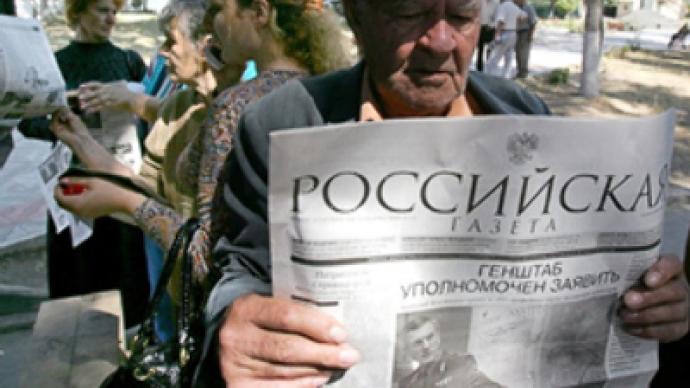Review of Russian newspapers

The 'Caucasus problem' continues to occupy most of the front pages of Russian newspapers. Many of them have interesting reports as well as commentaries and analysis articles concerning the issue. Here is a review of seve
ROSSIYSKAYA GAZETA published a commentary on the visit of the French Prime Minister Nicholas Sarkozy to Moscow written by the Chairman of the Federation Council's Foreign Affairs Committee, Mikhail Margelov. The chairman says that it was expected that the French Prime Minister would voice the EU opinion on Russia's recognition of South Ossetia's and Abkhazia's independence. At the recent EU summit the member states agreed to oppose Russia's decision. However, the recognition is official and Russia, as President Medvedev has stressed once again during the Moscow meeting, is not going to reconsider its position. It seems, writes Margelov, that Europe will have to take a softer stance on the issue during the upcoming meeting in Geneva. Another problem between Russia and the EU is the allegation of excessive force by Russia in retaliation to the Georgian attack on Tskhinvali. That allegation, it seems to Margelov, is somewhat strange. Should Russia have let Saakashvili's “clearing of the field” with artillery and missiles continued to its logical end? Disagreements aside, Chairman Margelov says the idea of a multi-polar world has probably found its way into Nicholas Sarkozy's heart. The French Prime Minister was very emotional when he spoke of Europe's independent role in the process of resolving the Caucasus conflict.
The same paper has an opinion piece by Leonid Radzikhovsky who plays on the two meanings of the word “pride”: the commonly used positive connotation and the Biblical negative. He says national pride was the main reason behind Russia's “little victorious war” in the Caucasus. National pride, or imperial pride, says Radzikhovsky, is good for the nation's prestige in the world and for the national economy. It helps to make the state stronger. However, he warns, too much of it is bad for a nation, even dangerous. Too much national pride is a sin, he insists. It produces the feeling in a nation that it was once great and imperial but then later humbled, leading to an overall sentiment of having been mistreated. The author says, this leads directly to a revenge mentality and that, in turn, begets conflict and war.
NEZAVISIMAYA GAZETA reports from The Hague. Hearings on the Georgian suit against Russia have commenced at the UN International Court. The paper says that the primary task for the Russian defense team is to prove that the Court does not have proper jurisdiction for the case and that restoration in Abkhazia and South Ossetia can be achieved without a court trial. If that course fails, Russia and Georgia can expect to be tied up in a lengthy court procedure that may take years to conclude. The paper says that, although the best American lawyers are representing Georgia in their case against Russia, absurd accusations such as race discrimination and segregation, included in Georgia's lawsuit, may render their efforts useless.
KOMSOMOLSKAYA PRAVDA continues the topic with a report headlined “Suing Russia: What are Georgia's Chances?” Komsomolskaya Pravda says the Georgian presentation of the case panders to the emotions of the eleven UN Judges, while Russia's case is aimed at their sense of reason and logic. Georgia's case is presented by a team of young European and U.S.-educated Georgian officials as well as several famous American lawyers. The Russian team consists of senior officials from the Foreign Ministry and several famous European lawyers. The paper continues to say that if Georgia manages to prove the accusations of race discrimination and segregation of Georgians at the hands of Russia, then the case is within jurisdiction of the UN International Court. The article reminds the readers that it took 13 years of hearings for Bosnia to eventually lose its case against Serbia. The paper concludes: if the jurisdiction is proven, a similar fate may befall Georgia's suit against Russia.
IZVESTIA quotes Belarus President Alexander Lukashenko on the Caucasus issue. Talking to the paper's correspondent: “That's not a conflict between Russia and Georgia. That's the Americans catching one right in the teeth for the first time in years! It's quite impressive.” The President also made it clear to the correspondent that the recognition of South Ossetia and Abkhazia by Belarus is only a matter of time. The issue will be raised in the Belarus Parliament as soon as it convenes after the summer vacation.
VREMYA NOVOSTEI criticizes President Lukashenko, saying he has found the perfect pretext to drag his feet on the issue of the recognition of South Ossetia and Abkhazia through his own unwillingness to go against normal procedure and call a special session of parliament before the end of the summer vacation.
Evgeny Belenkiy, RT












